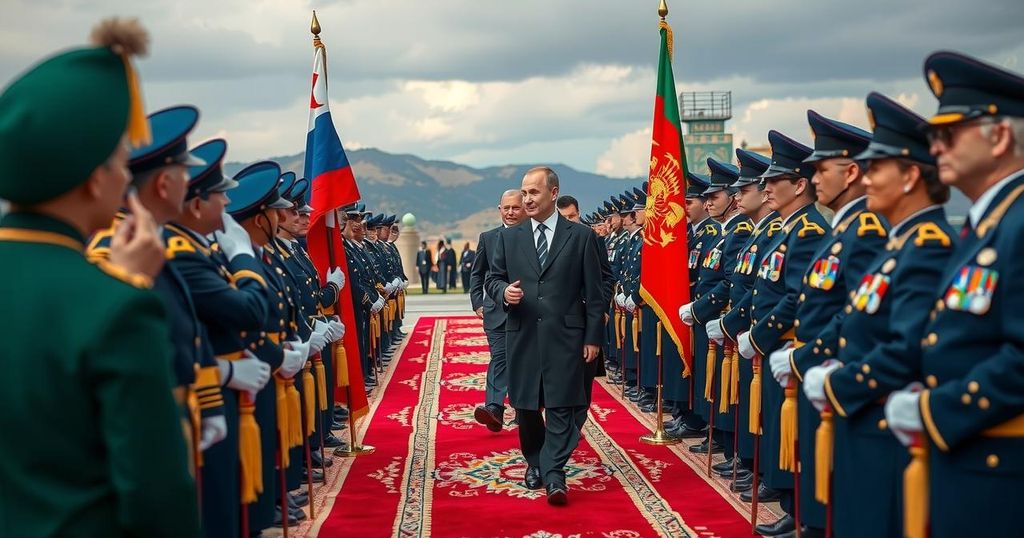Putin’s Mongolia Visit: A Diplomatic Balancing Act Amid War Crimes Allegations
Russian President Vladimir Putin’s visit to Mongolia has sparked controversy, as he faces accusations of war crimes from the ICC. Despite international calls for his arrest, Mongolia’s leaders reaffirmed their close ties with Russia, emphasizing the importance of maintaining diplomatic relations. Public opinion is divided, with protests occurring against Putin’s presence, reflective of the nation’s struggle to balance its foreign policy amidst external pressures.
On Monday night, Russian President Vladimir Putin arrived in Ulaanbaatar, Mongolia, marking the beginning of a significant visit amid international scrutiny regarding his war crimes allegations related to the conflict in Ukraine. Meeting with Mongolian President Ukhnaagiin Khurelsukh at Genghis Khan Square, Putin emphasized the strong ties between the two nations. This visit comes despite opposition and calls for his arrest from entities including the International Criminal Court (ICC) and various Western governments, which criticized Mongolia for failing to comply with obligations under international law.
During his stay, Putin remarked on Mongolia’s “respectful attitude,” highlighting the alignment of their views on several pressing international matters. Despite being sought by the ICC for the illegal deportation of Ukrainian children, the Kremlin dismissed concerns regarding a potential arrest. Observers noted that Mongolia’s historical and geopolitical context—situated between Russia and China—makes it challenging for the nation to navigate these demands while maintaining its diplomatic relations.
Public sentiment in Ulaanbaatar appeared divided, as some residents felt that arresting Putin would be inappropriate given the importance of his country to Mongolia’s national interests. Comparatively, a small contingent of protesters expressed their dissent, calling Putin a war criminal, though they faced police intervention that prevented larger demonstrations from occurring. As previously noted, Mongolia has maintained a neutral stance on the Ukraine conflict and sought to assert its sovereignty amid external pressures.
Mongolia, a vibrant democracy positioned between Russia and China, navigates a complex geopolitical landscape characterized by reliance on its larger neighbors. Since the dissolution of the Soviet Union, the country has aimed to foster friendly relations with both Moscow and Beijing while maintaining diplomatic independence. As a signatory to the Rome Statute, which established the ICC, Mongolia is expected to detain individuals sought by the court, such as Vladimir Putin, amidst accusations of war crimes stemming from the ongoing conflict in Ukraine. However, the nuanced diplomatic relations make it difficult for Mongolia to act against Putin during his high-profile visit, which also commemorates historical military achievements in the region.
In conclusion, Putin’s recent visit to Mongolia signifies a critical moment in the nation’s foreign policy, as it balances the demands of international law against the pressing need for diplomatic relations with its powerful neighbors. The visit has incited a mix of support and opposition within Mongolia, highlighting the complexities of aligning national interests with global accountability standards. The discourse surrounding this event reflects the challenge of upholding international norms while catering to immediate geopolitical realities.
Original Source: www.channelnewsasia.com




Post Comment